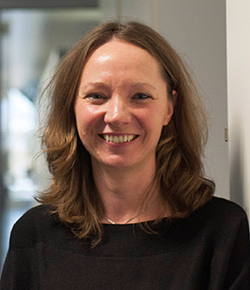Brügger lauded for quality science and outstanding productivity
Britta Brügger of Heidelberg University is the winner of the American Society for Biochemistry and Molecular Biology’s Walter A. Shaw Young Investigator in Lipid Research Award for her work on lipid–protein interactions and lipid sorting.
“Britta Brügger is simply a winner,” declared Vytas A. Bankaitis of the Texas A&M Health Science Center, who nominated Brügger for the award. Brügger’s work, which showed that the binding of the transmembrane domain of the p24 cargo receptor proteins to a specific molecular species of sphingomyelin is of functional significance, is “a real tour-de-force,” Bankaitis said, “that has broad implications for protein-lipid interactions in integral membrane proteins.”
 "I am thrilled and very honored to be this year's recipient of the Walter Shaw Young Investigator Award. I share this award with my co-workers in the laboratory and am grateful to my collaborators for their important contributions, helping us to study protein-lipid interactions in a truly interdisciplinary way. Many thanks also to the German Research Foundation. Without its support, this work wouldn't have been possible." — BRITTA BRÜGGER
"I am thrilled and very honored to be this year's recipient of the Walter Shaw Young Investigator Award. I share this award with my co-workers in the laboratory and am grateful to my collaborators for their important contributions, helping us to study protein-lipid interactions in a truly interdisciplinary way. Many thanks also to the German Research Foundation. Without its support, this work wouldn't have been possible." — BRITTA BRÜGGER Using quantitative lipidomic strategies, Brügger’s group has achieved several exciting new discoveries. It found that HIV-1 morphogenesis requires a specific lipid microenvironment, that p24 cargo receptors need specific lipid-protein interactions, and that sphingomyelin nanodomains exist and are defined by the interactions of specific sphingomyelin species with cholesterol. Bankaitis described Brügger’s studies as original and impactful and the result of longstanding collaborations. Not only has Brügger demonstrated excellent scholarship in her career, he said, but she also has “amply demonstrated execution of quality science and outstanding productivity.”
Brügger earned her undergraduate degree in Germany at Frankfurt University. She earned her Ph.D. in the laboratory of Felix Wieland at the Ruprecht Karls University in Heidelberg. After a two-year postdoctoral fellowship at the Sloan Kettering Institute in the laboratory of James E. Rothman, Brügger returned to Germany and the lab of her graduate mentor. In 2002, she took a staff-scientist position at the Heidelberg University Biochemistry Center. In 2014, she accepted a faculty position at the Heidelberg University, and she is now a dean there.
With several publications in top-tier journals, memberships in academic societies and now awards, Brügger has left her mark in the field of lipid research already. Despite being so successful, Bankaitis said, Brügger is modest and humble. She is careful in her analysis and does not overstate her science, he added.
Bankaitis also said that, given the opportunity, he would value Brügger’s contributions to his students’ thesis committees. “I always counsel my students in the importance of choosing the right faculty for their committees, that they should choose faculty whose scientific insight they respect, that their committee members be well respected by the broader scientific community, that their committee members be available to them for scientific interaction, that their committee members be easy to interact with, and that their committee members exhibit the scientific honesty of providing the critical input needed,” he explained. “Frankly, I find faculty who fit all of these criteria to be in short supply. My opinion is that Britta Brügger is one such faculty member. As a matter of principle, is there any higher compliment one can offer a colleague than seeking his/her counsel in the training of one’s graduate students?”
Instituted in 2010, the Walter A. Shaw Young Investigator in Lipid Research Award, named after the founder of Avanti Polar Lipids, recognizes scientists with 10 or fewer years of experience who have made significant contributions to lipid research. The winner each year is invited to give a talk at the society’s annual meeting and receives a plaque and a cash prize of $2,000. Mary L. Kraft won the award last year.
Enjoy reading ASBMB Today?
Become a member to receive the print edition four times a year and the digital edition monthly.
Learn moreGet the latest from ASBMB Today
Enter your email address, and we’ll send you a weekly email with recent articles, interviews and more.
Latest in People
People highlights or most popular articles

Simcox wins SACNAS mentorship award
She was recognized for her sustained excellence in mentorship and was honored at SACNAS’ 2025 National Conference.

From humble beginnings to unlocking lysosomal secrets
Monther Abu–Remaileh will receive the ASBMB’s 2026 Walter A. Shaw Young Investigator Award in Lipid Research at the ASBMB Annual Meeting, March 7-10 in Washington, D.C.

Chemistry meets biology to thwart parasites
Margaret Phillips will receive the Alice and C. C. Wang Award in Molecular Parasitology at the ASBMB Annual Meeting, March 7-10 in Washington, D.C.

ASBMB announces 2026 JBC/Tabor awardees
The seven awardees are first authors of outstanding papers published in 2025 in the Journal of Biological Chemistry.

Decoding how bacteria flip host’s molecular switches
Kim Orth will receive the Earl and Thressa Stadtman Distinguished Scientists Award at the ASBMB Annual Meeting, March 7–10, just outside of Washington, D.C.

Thiam elected to EMBO
He was recognized during the EMBO Members’ Meeting in Heidelberg, Germany, in October.

